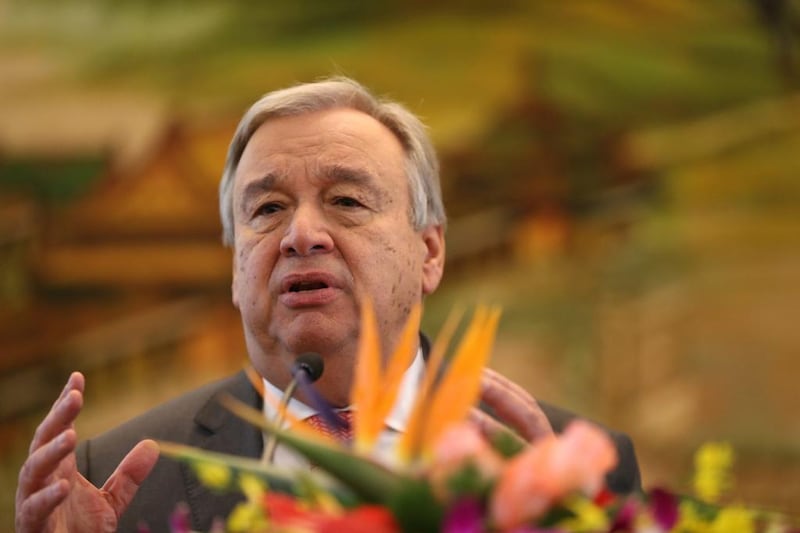In seven weeks the White House will be occupied by an unknown quantity, a businessman with no political experience who has devoted his life to the “art of the deal” – most recently a pact with the angry voters of America to secure the presidency. As Donald Trump puts together his administration in a talent show format behind the golden doors of his penthouse, his transition team has not impressed the watching world. His core voters see things differently – they love to see the establishment humiliated.
Diplomats are wondering where after January 20 they will find the solid ground that the international system has rested on for so many years. Even those who challenge American supremacy have got used to the predictability and relative transparency of Washington.
Global leadership is not going to come from Europe. Even if Angela Merkel, the German chancellor, is re-elected next year, the continent will be preoccupied with its mounting internal crises.
So where to turn to? Surprisingly, thoughts are turning in an unlikely direction, to the next United Nations secretary general, Antonio Guterres, who takes office on January 1. This is a rare occasion when a UN chief takes office at the same time as the US presidency is in transition.
UN chiefs are usually selected for qualities that will not disturb the peace of the major powers, which generally means proposing too active a role for the UN in places where Washington wants a free hand. Mr Guterres is cut from a different cloth.
Mr Guterres won his position not through usual back room deals, but through an open contest where, as an experienced politician, he was able to outshine rivals from technocratic backgrounds. It had been the consensus that the job should go to a woman – for the first time – and that she should come from Eastern Europe. But there was no real competition to a man who has served as prime minister of Portugal (the first government leader to hold the top UN job) and then as a forceful and passionate UN high commissioner for refugees.
In that job he started by cutting headquarters costs by some 20 per cent, arguing that the money should be spent on the refugees. He managed to raise funds while criticising the major donors – both the United Sates and the Europeans – over the failings of refugee policies.
So at a time when Washington is adrift, a top-quality administrator who combines passion with pragmatism is about to take over at UN headquarters. His transition team, in contrast to the Trump circus, is purring along nicely, as Mr Guterres travels to visit his new bosses in Moscow and Beijing. It seems a wonderful opportunity. Just as the UN seemed fated to sink into irrelevance for its impotence to heal the bleeding wound of the Syria crisis, here comes a brave operator with a record of bridge-building dating as far back to the Portuguese revolution of 1974.
He has set his sights on a resolution to the Syrian war, a task which has defeated diplomats of the calibre of Kofi Annan, Lakhdar Brahimi and currently Staffan de Mistura. “It is the international community’s first priority to be able to end this conflict and then use the momentum created to try to address all the other conflicts that are interlinked.” No poverty of ambition there.
At this point, it is time to reel in the enthusiasm. Overburdening Mr Guterres with unrealistic expectations will do no good. The secretary general is the servant of the member states, or more precisely, the servant of the UN’s most powerful body, the Security Council, which is controlled by the five permanent members: China, France, Russia, the US and the UK. As the Russian ambassador to the UN, Vitaly Churkin, has pointed out, the UN system is impotent over Syria not because of the weakness of the outgoing secretary general but due to “dramatic contradictions in the Security Council which cannot be bridged.”
It should also be pointed out that the UN system’s legitimacy is constantly challenged by its inability to adjust to the changed global balance of power over the past 70 years. Even worse, Mr Trump’s “America First” policy could cripple the UN system – the United States provides 22 per cent of the organisation’s regular budget and large voluntary contributions to its agencies. Mr Trump has not shown respect by appointing as his UN ambassador the South Carolina governor, Nikki Haley, a businesswoman not known for her experience in foreign affairs.
For the moment there is a space at the top of the diplomatic pyramid for an experienced mediator, and Mr Guterres looks like the man to fill it. If the contradictions between Russia and the US are at the moment unbridgeable, history shows that they may not be forever.
With Washington drawing back from global leadership, there are rare opportunities for change. In Beijing, Mr Guterres has been talking about climate change, which during the second Obama term was a joint US-China enterprise. If Mr Trump is no longer interested in being the leader in carbon reduction, China could step up. Success would transform China’s image as a world power committed to making the international system work. There would be some risks – such as greater scrutiny of everything China does. It was noted that Mr Guterres did not pass through Beijing without a polite but surely unwelcome reminder that economic growth needed to be balanced with “human rights and civil and political rights”.
The chance that the UN under Mr Guterres may rise to its primary task of promoting peace is a rare chink of light in a darkening world. But it is also a possibility that the world system may get more broken, and will take the United Nations down with it. For once the UN has a leader who is up to the task before him if anyone is.
Alan Philps is a commentator on global affairs
On Twitter @aphilps





